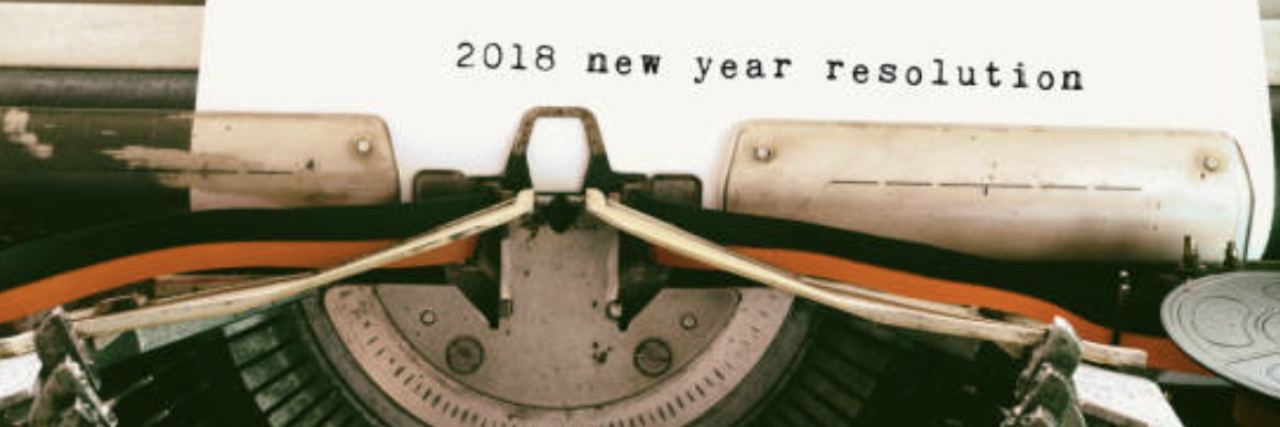Eat healthier. Exercise more. Get more sleep. Meditate. Read more books.
It’s been years since I’ve made New Year’s resolutions. I used to relish the opportunity to set intentions from a clean slate. It was fun to challenge myself. But after my diagnosis, when my scale of what mattered in life forcibly recalibrated, none of the prior resolutions seemed to hold much weight. Quite frankly, it all seemed so silly. Battling a chronic disease, I no longer had the luxury of seeing life through short-term, annual goals. I was forced to take the long view. I had to resolve to find a way to survive emotionally while my body deteriorated physically.
It took me a couple years to figure out how to navigate the process. I hid for a while, not knowing how to accept what was happening to me, let alone share it with others. I was stuck in wishing it weren’t true, in wishing people would never find out. Back then, I was still able to hide underneath some layers. I can’t quite remember when I peeled off the first outer layer. Maybe it was when I burst into tears sitting in my residency program director’s office, telling him about my recent diagnosis. Or maybe it was when I stood on the street corner in front of my office building, spontaneously telling my new suite mate my secret.
Regardless, once I learned how to shed my outerwear, I started to feel more comfortable. I went a little further. Two years into my diagnosis, I gave a “coming out” speech at the first annual Neuromuscular Disease Foundation gala. I stood up and cried in front of 600 guests, sharing my most intimate thoughts and feelings of living with this disease. It was uncomfortable and liberating. Scary and reassuring. Ultimately, it was a tremendous relief. This was who I was, this was what was happening to me. Now everybody knew. Five years in, I wrote my first blog post.
Layer by layer, I’ve been undressing in front of others. In 2017, I went even further. After almost 12 years of trying to erase or prevent any kind of digital footprint connecting me to my disease, I wrote my first piece for the Los Angeles Jewish Journal. A few months after that, I became an official contributor for The Mighty. I’ve even added a photo and a bio to my anonymous blog.
Here’s what happened when I stripped down to (what felt like) almost nothing in 2017:
I received a voicemail from an 80 year old retired OB/GYN thanking me for my Jewish Journal article. He told me how much he admired me and that he didn’t have “one tenth of the courage” I had.
A regular blog reader shared one of my posts with an artist friend of hers who was going through a hard time. She was subsequently inspired to create a piece of art entitled, “Locking Eyes with the Beast of Pain and Loss.”
A woman in New York who lost her daughter to a genetic disease nine years ago came across my article about feeling feelings. She was moved by how deeply it resonated with her own grieving process. She posted it on her Facebook page. “What amazes me about this article is the author’s understanding that feeling her emotions (her sadness, anger, pain) is the only way to feel gratitude and meaning in her life.” I only learned about her post because she is coincidentally the cousin of a dear friend and NDF board member here in LA.
My friend in Israel is an autism specialist and published author who has been working with families from around the world for over 20 years. She dedicated a video blog to my recent piece about cultivating happiness in the face of fear and uncertainty, believing members of her community would relate to and benefit from it.
Finally, the senior rabbi at my temple has invited me to speak to her “LifeQuest” group-congregants who are navigating life’s transitions after age 60-to share my strategies on coping with change, from both a professional and personal standpoint.
I share all of the above to illustrate one fundamental truth: we are all the same naked on the inside, just different shapes and sizes. Yes, from the exterior we seem different, but on the inside we are far more similar than not. Not one person who was touched by something I wrote is personally struggling with a progressively debilitating muscle-wasting disease. Yet everyone could relate to the pain and the grief and the loss. It is a universal experience. Don’t be afraid to reflect that in how you live your life. Now more than ever, we need to feel connected to one another. We need to have compassion for each other and we need to be there for each other.
We want to hear your story. Become a Mighty contributor here.
Image provided by contributor.

